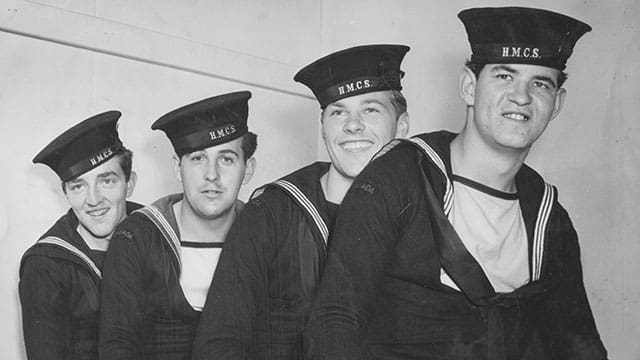Second World War vets harnessed the skills they learned in uniform to transform post-war industries
The following is a heartfelt tribute by Allan Bonner to the brave men and women who have served in defence of our freedoms. Written to commemorate Remembrance Day, Bonner’s stories capture moments of courage, sacrifice, and humanity amid the hardships of war. Through these historical snapshots, he honours the legacy of those who fought for peace and the values we cherish, ensuring their contributions will never be forgotten.

For interview requests, click here
Both my father and I had challenges which began with office intercoms. I was right out of journalism and not accustomed to being summoned.
My intercom was in my office in North York City Hall. I was Mayor Mel Lastman’s Executive Assistant.
“The Mayor’s looking for you …” came the voice of the Mayor’s secretary/receptionist.
Mayor Lastman was the millionaire Bad Boy Appliance store owner and super-salesman who ran for office as a publicity stunt, accidentally won, and became the world’s longest-serving big-city mayor. He wasn’t street smart but street brilliant. He had a near-photographic memory but no time for irrelevant details.
“Um … um … will you come in here please …” was the way the Mayor used the intercom. I assumed he couldn’t remember my name or how to summon me, or both.
 Courtesy Royal Canadian Navy |
| Recommended |
| How wartime merchant mariners faced danger head-on
|
| How a seasick electrician learned his lesson
|
| How a teenager tamed a tattooed sailor and took charge
|
I’d soon appear in the doorway of the Mayor’s long, thin office. As I entered, the Mayor would say to the two or three blue suits on the couch:
“This is my Executive Assistant … and … maybe he can help.”
Then the Mayor would walk to his private washroom at the back of the office.
Whether I could help with an unspecified problem with unknown people was a moot point. I might just have been a diversion.
I had little idea how to handle this kind of guessing game show, so I sought advice from my father. Turns out he’d had similar experiences.
My father’s boss with the intercom was Harry Cohen, QC, millionaire Montreal developer of Cantlie House at Peel & Sherbrooke (where Pierre Trudeau lived for a time).
Harold Bonner’s intercom would gently state:
“Mr. Bonner, would you come in here please?” (Mr. Cohen knew my father’s name).
As my father entered, Mr. Cohen would introduce my dad to a guest with a question:
“This is Mel Sobritz of Sobritz Construcion. How much do we spend on doorknobs?”
At least my father was told the name of the guest and the issue. Mr. Cohen was flummoxed that my father didn’t have the price of doorknobs in his mind.
Harold didn’t like these surprises but had a solution. He’d learned the value of details, knowing all of what went on in his Merchant Navy ship in the Second World War, following orders, having answers, and so on. So, he put in a policy that he signed every purchase order for more than $5.00. This was 1965, and he had a lot of purchase orders to look at. Diverse information stuck, and the next time he was summoned, the command performance went like this:
Cohen: “Mr. Bonner, how much do we spend on toilet paper?” was the question in front of a new guest.
Bonner: “$X a roll but when we buy in cartons we get about a five per cent reduction. We’d go with job lots but then there’d be pilfering and storage problems.”
Cohen: “Bloggins (toilet paper salesman) – get out of my office!”
Or
Cohen: “Mr. Bloggins says we can get a better deal with him.”
Bonner: “First, he’s not accounting for pilferage or storage. Second, I did business with Mr. Bloggins at the Mount Royal Hotel and if we want sandpaper I’ll be pleased to place an order with him, but if it’s toilet paper, I prefer our current supplier.”
Cohen: “Bloggins – get out of my office!”
I put in a similar policy to emulate my dad.
I had city staff make a file of relevant Council resolutions, submissions, letters, etc. When I had free time I’d open up the file, read, laugh, ask questions of staff, and ponder.
The next time my intercom beckoned, I’d arrive with a new routine. As Mayor Lastman went to the washroom, I’d introduce myself slowly to the blue suits. Usually, none of the famous millionaires had the sense to introduce themselves. Having been a broadcaster on live shows, I was accustomed to vamping for time.
If I caught a name, I’d riff on that like a jazz musician:
“Ah … yes … I see your signs on new developments …”
If I caught a street name, I’d riff on the new subway stop going in there, traffic problems, or ratepayer concerns.
One of the millionaires on the couch would either exclaim:
“That’s why we’re here!” to which I’d say, “I know,” and add questioning to my riffing.
Or the millionaire would exclaim:
“That’s not why we’re here!” to which I’d respond, “I know!” and ask the millionaire to set the agenda.
Two generations of Bonners vanquished the intercom and pleased the bosses.
Published in time for Remembrance Day, Allan Bonner’s stories highlight moments of courage, sacrifice and humanity amid the struggles of war. He drew on the experiences of his father, Harold Bonner, who served in the Merchant Navy during the Second World War. After returning home, Harold applied the discipline, attention to detail, and adherence to procedures he had gained in the military to his career in real estate development. Following in his father’s footsteps, Allan carried these principles into his consulting work on challenging issues across five continents. The skills Harold and Allan displayed in civilian life are a testament to the lessons learned in uniform.
Explore more on Remembrance Day, Second World War, First World War
Troy Media
Troy Media is committed to empowering Canadian community news outlets by providing independent, insightful analysis and commentary. Our mission is to support local media in building an informed and engaged public by delivering reliable content that strengthens community connections, enriches national conversations, and helps Canadians learn from and understand each other better.

